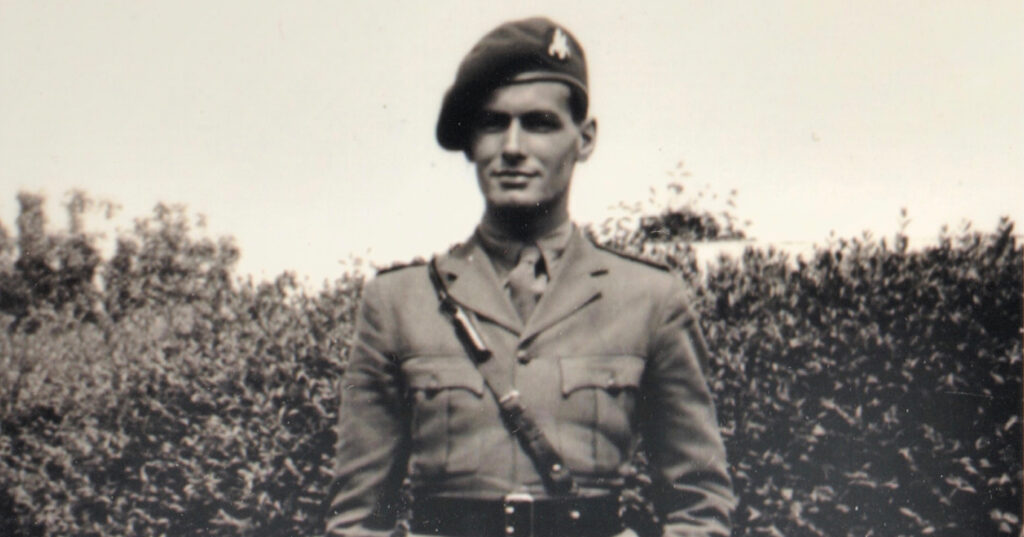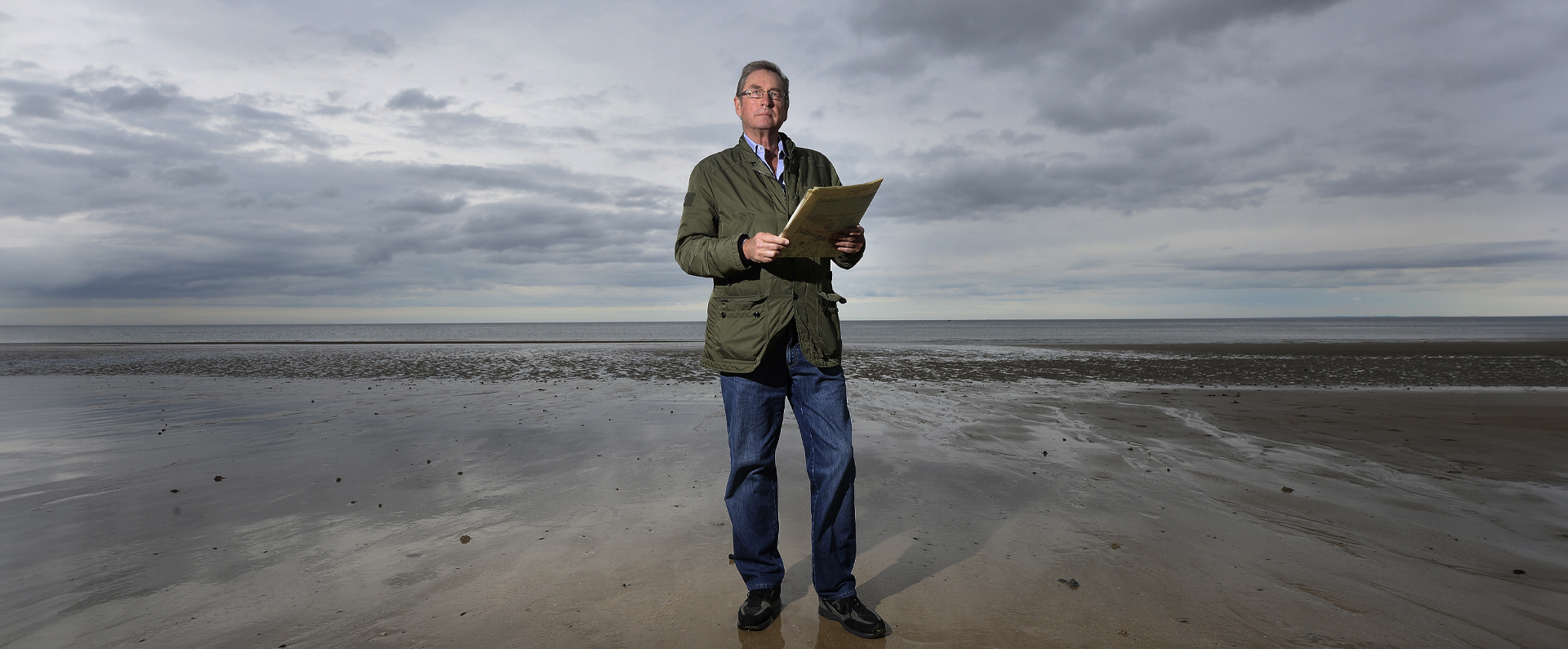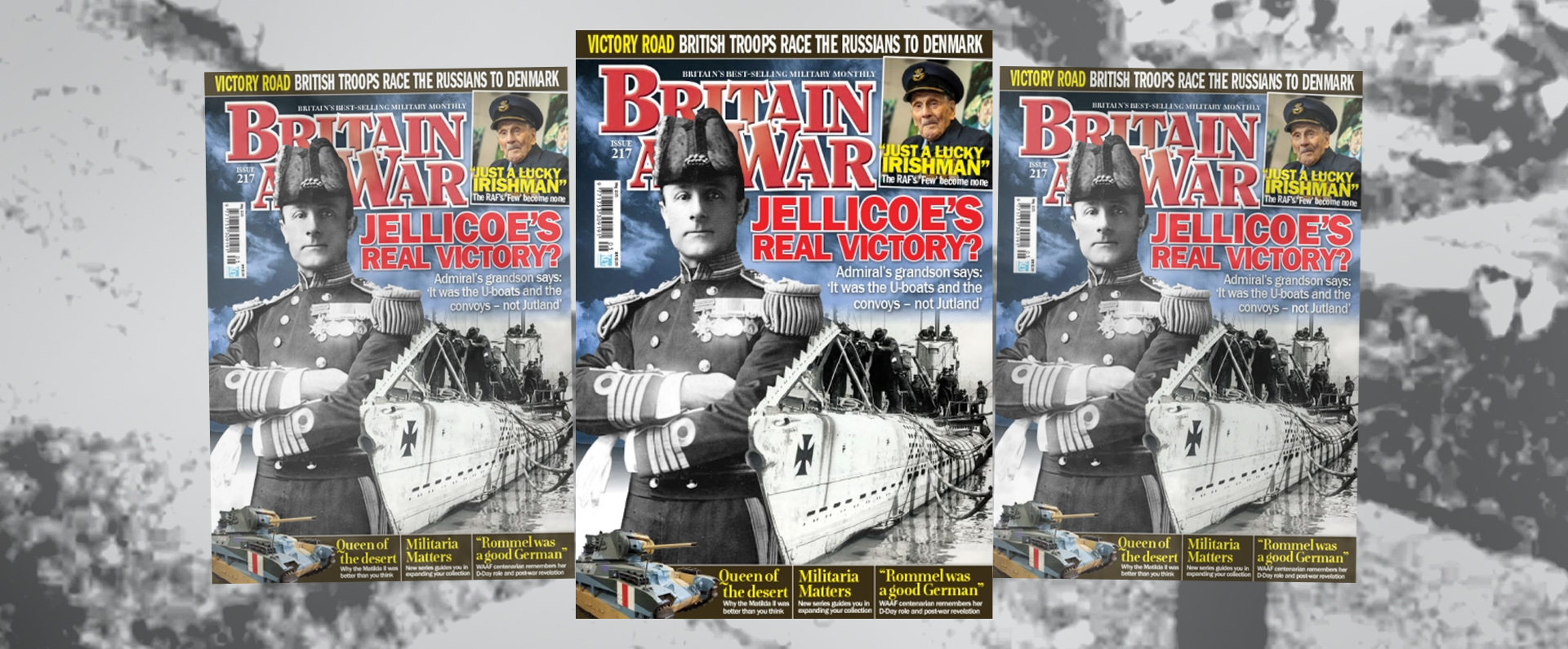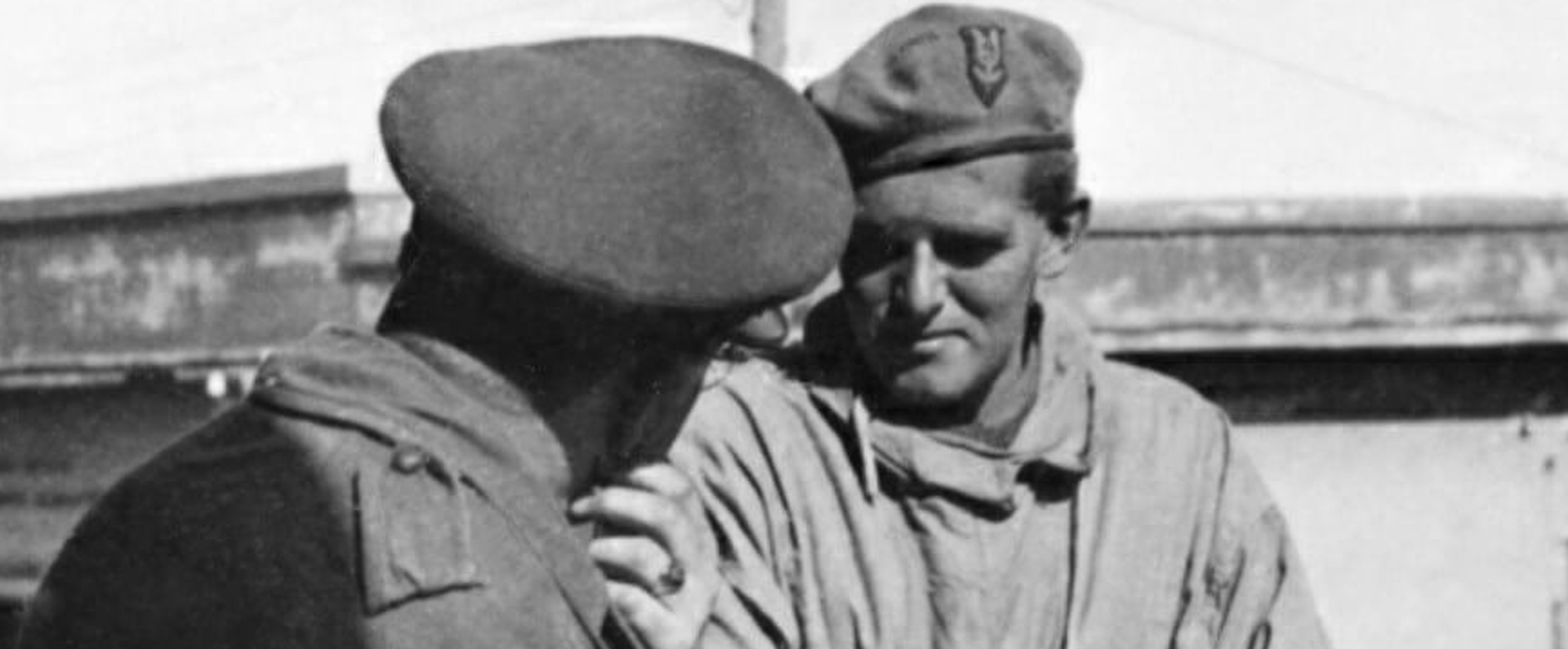
Published in Britain at War in April 2022.
Major Sir Ambrose Joseph McGonigal KBE, MC & Bar
In war and peace, Ambrose McGonigal lived an extraordinary life, with conflict never far away. During the Second World War, he served as a Commando and in the SBS, while after it he served in Belfast as the most senior Catholic judge during the height of the Troubles.
I first came across the bravery of Ambrose McGonigal and his younger brother Eoin two years ago while researching the life of the legendary SAS officer, Lieutenant Colonel Blair “Paddy” Mayne, DSO & three Bars. Mayne is arguably the bravest man never to be awarded the Victoria Cross and, had he enjoyed a more conventional career, that decoration might well have been bestowed upon him. But that’s another story for another day.
My research into Mayne’s life and career brought me into contact with Patric McGonigal, Ambrose’s eldest grandson and whose new book on the brothers, Special Forces Brothers in Arms. Eoin and Ambrose McGonigal: War in the SAS and SBS, is published this month [April 2022].
Much of the information in this article comes from the book and is reproduced with the author’s knowledge and blessing. In fact, I should declare an “interest” in that, at the request of Patric McGonigal, I wrote the Foreword to the book in which I congratulated him for “delivering a diligently-researched work that is beautifully illustrated with family photographs and other striking images.”
Ambrose Joseph McGonigal was born in Dublin on November 22 1917 – during the second half of the First World War and just a year after the Easter Rebellion that saw armed resistance to British rule. His younger brother, Eoin, was born three years later in 1920, the same year that the Government of Ireland Act was passed that resulted in the partition of the country the following year. However, Ambrose, also had a much older brother, Richard, who was 15 years his senior, and four sisters.
Their father was John McGonigal KC (King’s Counsel), who was a senior barrister in Dublin. Unusually, John McGonigal came from a “mixed” religious background with his father a Catholic and his mother from a well-known Presbyterian family in Belfast.
In 1922, the year that the Irish Free State came into existence, the family moved to Belfast, the home city of John McGonigal, who was one of no less than 17 siblings. Such a move had its challenges but John went on to become the chief crown prosecutor for Belfast and, in time, was elected the “father” of the Northern Irish Bar and appointed to the bench as a judge in Tyrone.
Home for the family in Belfast was a substantial seven-bedroom property in Malone Road. By the time the younger brothers were at secondary school, the oldest brother, known to family and friends as “Dick”, was already one of the leading young lawyers at the Irish Bar and would later go on to become Ireland’s first judge at the European Court of Human Rights in Strasbourg.
Both younger boys attended boarding schools south of the border, for much of the time being pupils at Clongowes Wood College in County Kildare, the so-called “Eton of Ireland”. Both boys were academically bright, but also sporty (both representing Leinster at rugby) and adventurous.
After leaving school, both also seemed set on law careers. Ambrose initially attended Queen’s University in Belfast (QUB) where in his own words, he spent “two inglorious years” studying for an arts degree – before enrolling at King’s Inns in Dublin with the aim of becoming a barrister. In fact, both brothers only managed to complete a year’s legal study before war broke out in September 1939, when Ambrose was aged 21.
Both brothers enlisted within days of the outbreak of war, with both resolved to tackle the evils of Nazi Germany. On September 6 1939, Ambrose enlisted with the TA, Royal Ulster Rifles (RUR). On September 7, Eoin was posted to the RUR’s Infantry Training Centre (ITC) and commissioned as a junior officer. Both were posted to the RUR’s ITC at St Patrick’s barracks in Ballymena where they soon forged a strong friendship with Blair “Paddy” Mayne, a Protestant and who Ambrose already knew from his time playing rugby at QUB.
During training, Ambrose broke his leg in a motorcycle accident while Eoin and Mayne soon joined up as members of the newly-formed 11 Commando and, later, the nascent SAS. However, Eoin died in November 1941, aged 20, from wounds received during the SAS’s earliest mission, Operation Squatter, in Libya.
Within days of officially being informed that Eoin was missing in action, Ambrose was married on December 19 1940 to Patricia “Paddy” Taylor, whom he had met while training in Ballymena. Having served with the RUR, Ambrose joined 12 Commando on May 21 1943, by this point looking for revenge over his brother’s death. 12 Commando was often simply known as the “Irish Commando” because so many of its members were Irish.
One of his comrades, Ian Smith, later recalled that Ambrose had “an insatiable thirst” for adventure and was “totally without fear”.
With the disbandment of 12 Commando, Ambrose’s next posting was to “Layforce II” – a group of small -scale raiding forces brought together to conduct a series of high-risk, hit-and-run raids in Motor Torpedo Boats (MTBs) along the French coast and Channel Islands. During December 1943, reconnaissance operations were stepped up for “Operation Overlord” – this was the codename for the Battle of Normandy, the Allied operation to liberate German-occupied western Europe.
However, during one mission on Sark, codenamed “Operation Hardtack 7”, Ambrose was wounded by an anti-personal mine while going to the aid of an injured comrade. For this action, he was recommended for the Military Cross (MC) by Lieutenant Colonel Peter Laycock, OC of Layforce II, in the following terms:
“On the night of 27th December 1943 the above named officer [Lieutenant Ambrose] was ordered to land on the Island of Sark with a small force to carry out a reconnaissance, obtain certain information, and if possible capture a prisoner. Very shortly after landing, the patrol penetrated into an unsuspected minefield. Two mines went up in quick succession, killing one of the force and badly wounding another. Surprise having been lost Lt McGonigal ordered the patrol to withdraw to the beach with the dead and wounded men, having first examined the hole made by one of the mines and obtained the metal container left in it. Almost immediately after the patrol commenced its withdrawal a further four mines went up, killing the already badly injured man and wounding Lt McGonigal and a further two other ranks. In spite of his injuries Lt McGonigal continued personally to direct the difficult withdrawal down the cliff and by refusing all offers of assistance allowed greater aid to be given to the other injured members of the patrol. This officer personally signalled in the dory [a small shallow-draft boat], superintended the embarkation of the wounded, and retained his command until the M.T.B. was reached where for the first time he received medical attention. Lt McGonigal showed great powers of leadership and devotion to duty throughout all phases of the operation, and by his courage and gallantry extricated his force from its extremely hazardous position. He has on several previous occasions taken part in similar operations and has shown throughout a high sense of duty, disregard for personal danger and superior powers of leadership.”
In May 1944, Ambrose became involved with what were known as the Dover “Tarbrush” raids. This led to him receiving a Bar to his MC after this recommendation: “This officer [Lt. Ambrose McGonigal] was the commander of a military force which landed to the East of Calais on the North coast of France on the night of 16/17 May 1944, to carry out a reconnaissance of enemy beach obstacles. The operation was of the highest importance and was of an extremely hazardous nature, involving as it did a three mile approach to a heavily defended enemy coastline, by night in an 18 foot Dory, and the carrying out of a minute examination of beach mines and obstacles of unknown potentialities. During the run in, and the return passage to the parent M.T.B., Lt. McGonigal was forced to alter course on two occasions to avoid a single enemy vessel and a convoy of seven vessels proceeding towards Calais a mile offshore. Despite such interference he so navigated his craft as to reach the selected landing point without error thus greatly facilitating the task of the landing party. Throughout the entire operation his skill, courage, and level headedness inspired his force to the maximum of effort and resulted in the obtaining of vital information.”
Later in May 1944, Ambrose switched to the SBS, at the time made up of men from 1st SAS, the Small Scale Raiding Force (SSRF) and other units. He was also promoted to captain and on June 2 1944, four days before D-Day, he was urgently deployed to Yugoslavia and, later, Crete. In August and September 1944, Ambrose and his force of eight men wrecked installations and ambushed German patrols in Yugoslavia. He later had other senior roles both before and after the end of the war.
Ambrose was demobilized from the Army in the rank of major, completing his law studies and being called to the Bar in 1948. He became senior crown prosecutor for County Down in 1964 before being appointed a judge of the High Court in March 1968 – at the beginning of some of the worst times during the Troubles in the north of Ireland.
In 1975 Ambrose was appointed to the Court of Appeal and the Privy Council, when he was also knighted. His judicial role was so dangerous that he was forced to carry a gun under his robes and also to keep it at his bedside every night. Ambrose continued as a judge until his death from cancer on September 22 1979, aged 61. He left a widow and four children.
- Special Forces Brothers in Arms. Eoin and Ambrose McGonigal: War in the SAS and SBS by Patric McGonigal is published by Pen and Sword this month (April 2022). It costs £25 and can be purchased from the Pen and Sword website. The book tells the stories of both brothers – their early lives, their wartime careers, their links to Blair Mayne, the death of Eoin following a failed SAS raid and, in the case of Ambrose, his post-war career too.
Download a PDF of the original Britain At War article
For more information, visit:
LordAshcroftOnBravery.com


